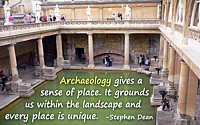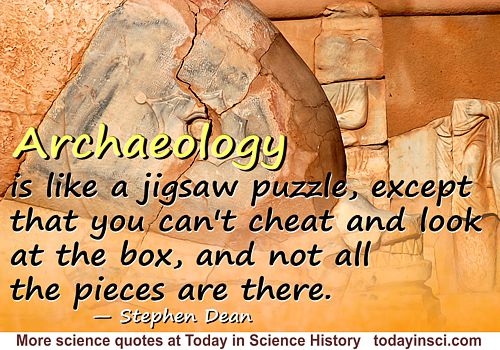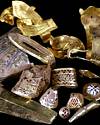Today in Science History - Quickie Quiz
|
|
Stephen Dean
( - )
archaeologist who is Principal Archaeologist at Staffordshire County Council
|
Stephen Dean - Archaeology is like a jigsaw puzzle
Illustrated Quote - Medium (500 x 350 px)
“Archaeology is like a jigsaw puzzle, except that you can't cheat and look at the box, and not all the pieces are there.”
— Stephen Dean
from interview in The Guardian.
This quote comes from interview article in the British newspaper, The Guardian. Sarah Marsh asked Stephen Dean about the most interesting archaeological find he had worked on. The answer came easily, as he was the principal archaeologist for the county council of Staffordshire. He had worked on the spectacular “Staffordshire hoard.” This the largest hoard of Anglo-Saxon gold and silver metalwork yet found in England, comprising hundreds of gold and silver objects. A hoard is deliberately buried in a hole, and this one had lain there for 1,300 years until discovered on 5 Jul 2009, by a metal detectorist, Terry Herbert. The nature of the curious assortment of objects is intriguing, and it remains enigmatic. Archaeological investigation is needed to place it in context. Dean explained:
One of the most interesting parts is the detective element. Archaeology is like a jigsaw puzzle, except that you can't cheat and look at the box, and not all the pieces are there.
Dean said his job also involves giving advice on planning applications to councils to “make sure the historic environment is taken into account in plans.” He could also be asked to assess uncovered human remains. An excavation he was about to start was on Cannock Chase. There, he would guide volunteer helpers to uncover an army camp and its inches-tall model of a Belgian village used as a training aid for soldiers preparing for an important First World War battle.
Text by Webmaster with quotes from interview article by Sarah Marsh, “Being a Council Archaeologist is ‘Like Being a Detective’”,
The Guardian (6 Sep 2013).
(source)

Photo credit: juliaavisphillips
(source)
See also:
- Science Quotes by Stephen Dean.
-
Stephen Dean - context of quote Archaeology is like a jigsaw puzzle - Large image (800 x 600 px)
-
Stephen Dean - context of quote Archaeology gives a sense of place - Medium image (500 x 350 px)
-
Stephen Dean - context of quote Archaeology gives a sense of place - Large image (800 x 600 px)
Nature bears long with those who wrong her. She is patient under abuse. But when abuse has gone too far, when the time of reckoning finally comes, she is equally slow to be appeased and to turn away her wrath. (1882) --
Nathaniel Egleston, who was writing then about deforestation, but speaks equally well about the danger of climate change today.
 Carl Sagan
Carl Sagan: In science it often happens that scientists say, 'You know that's a really good argument; my position is mistaken,' and then they would actually change their minds and you never hear that old view from them again. They really do it. It doesn't happen as often as it should, because scientists are human and change is sometimes painful. But it happens every day. I cannot recall the last time something like that happened in politics or religion. (1987) ...
(more by Sagan) Albert Einstein: I used to wonder how it comes about that the electron is negative. Negative-positive—these are perfectly symmetric in physics. There is no reason whatever to prefer one to the other. Then why is the electron negative? I thought about this for a long time and at last all I could think was “It won the fight!” ...
(more by Einstein) Richard Feynman: It is the facts that matter, not the proofs. Physics can progress without the proofs, but we can't go on without the facts ... if the facts are right, then the proofs are a matter of playing around with the algebra correctly. ...
(more by Feynman)







